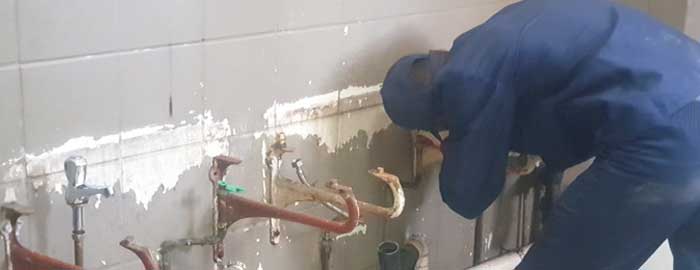
The International Water, Sanitation and Hygiene Foundation (IWSH) supported a recently completed project to repair toilets, basins and showers at an inner-city homeless shelter in Johannesburg, South Africa.
During the week of Sept. 13-17, 20 plumbing apprentice candidates and a supervisor from BluLever Education joined with seven plumbers from the Water, Amenities and Sanitation Services Upgrade Program (WASSUP Diepsloot) to install nine toilets, eight basins, eight showers, and 12 sinks at a 100-person facility run by nongovernmental organization Metro Evangelical Services (MES). The building, located in the New Doornfontein neighborhood, is being leased from the Department of Public Works. The volunteer teams upgraded six bathrooms and kitchen areas, and upgraded a drainage system for the communal kitchen.
IWSH connected with WASSUP Diepsloot and Sticky Situations, supporting remotely to launch this new initiative in partnership with Plumblink, BluLever Education and the Institute of Plumbing South Africa (IOPSA). Plumblink, a plumbing, bathroom, and kitchenware supplier across South Africa, generously donated the supplies.
The project comes at a particularly important time for Johannesburg, which has been hit by repeated water supply reductions and interruptions, sometimes for more than a week at a time, due to water towers being closed because of aging infrastructure and high demand. The shortages have led to protests and threats of violence.
“Our city is flowing with unhygienic water and sewage; it has become ‘normal,’” Sticky Situations Director Jennifer van den Bussche said. “But it is not normal; only individuals and organizations in the plumbing industry recognize the critical importance of adequate water and sanitation solutions. We don’t have data locally to link health with lack of adequate water and sanitation, but global data shows us that it costs economies millions; yet our city streets still flow with fluids that make people sick and die.
“It is very hard to raise funds for plumbing materials and maintenance, especially when the economy is plunging — toilets are just not sexy for funders and supporters outside of the plumbing industry.”
Whether they provided funding, expertise, food for the volunteers or help receiving exposure through social media or editorials, each organization played a role in making this project successful, van den Bussche added.
“We can't do these projects alone,” she said. “Everyone brings a different resource to the table and each contribution is valued equally because we don't all have the same background or access to the same things. And thank goodness for that or the world would be a very boring place.”
Lorraine Mooi, who heads up IOPSA’s Women In Plumbing program, was involved in the initial site visits in Johannesburg, and helped make the connection with the BluLever college facility located nearby.
Mooi explained that it had been important to get female apprentice plumbers involved with this hands-on “Workplace Exposure” project.
“A classroom is very different because everything is clean — the basin’s clean, the bathroom’s clean, but now there’s blockages, there’s a whole lot, this is real life,” she said. “And for them to get that experience very early on, it sets them up to understand that not every job will be a simple in and out.”
“These women were really instrumental in this whole project,” she added, “and it shows their commitment. We need to let women do what they need to do, to be part of the industry they’ve chosen to be part of.”
Mooi said she was hopeful the organizations involved could collaborate on additional projects in the future, and that it is important to bring the message about the opportunities and benefits a career in plumbing brings not only to major cities, but also to more remote areas.
“I think it’s important that, with other partners as well, we get a sense of a bigger footprint in terms of getting the message out there to women and letting them know that you can become a tradesperson, and you can become a successful one at that,” she said.
The new collaboration with MES and BluLever is the latest in a series of community plumbing and plumbing outreach projects that IWSH has helped deliver in partnership with WASSUP Diepsloot, Sticky Situations and IOPSA.
“We’re excited to continue building our long-standing partnerships in South Africa and increase the impact of this work by connecting further community-based partners such as BluLever and MES in Johannesburg,” said IWSH International Project Director Grant Stewart. “The recent effort in New Doornfontein has bought various industry expertise and resources together in a really effective way: it has given the BluLever plumbing apprenticeship candidates a great opportunity to foster their skills for future projects, and it has helped improve living conditions for vulnerable people staying in the shelter.”
Sticky Situations has facilitated the inception, training and growth of the community-led cooperative WASSUP Diepsloot since Global Studio initiated the program, in collaboration with local government officials, in Johannesburg in 2007. While operating primarily in the township of Diepsloot, the WASSUP team continues to support other community plumbing initiatives across the Gauteng region.
Visit http://www.stickysituations.org/wassup.diepsloot.html to learn more about Sticky Situations and WASSUP Diepsloot.
Visit https://www.iopsa.org/ to learn more about The Institute of Plumbing South Africa.
Visit www.iwsh.org/our-work/za to learn more about International Water, Sanitation and Hygiene Foundation work in South Africa.